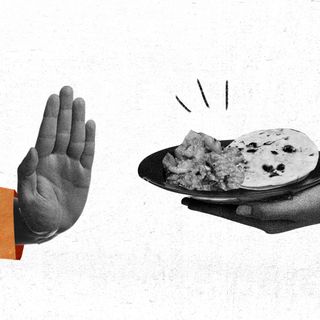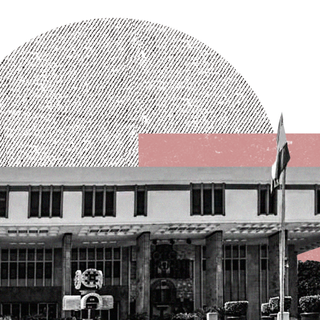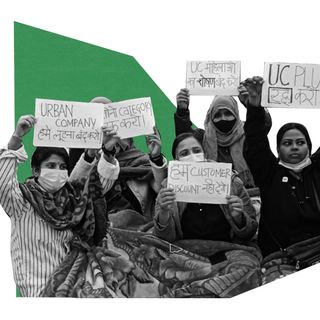
How Radical Kindness Can Be a Transformative Tool for Change
“It is the ability to look at this sometimes forsaken world with hope and love, even when it’s constantly breaking our hearts.”

When I sat down to work on this piece, bell hooks, the revolutionary feminist, poet, critic, writer, and philosopher, had just died. Many generations of feminists mourned the loss of the writer who brought them into the fold of what it means to think about injustice and power critically but also, and more importantly, compassionately. In this world, with all its strife and tragedy, she prompts the question: what does it mean to be radically kind in your politics?
“It is the ability to look at this sometimes forsaken world with hope and love, even when it’s constantly breaking our hearts,” says Yashna, 31, a writer and social worker.
The power of collective vulnerability speaks to how young people and collectives approach social justice today – wearing their hearts on their sleeves, unafraid to show the world their wounded spirits, and how they carry on nevertheless. The environmental group Extinction Rebellion (XR) echoes a remarkably similar sentiment. “We are radical in our kindness… We are a radical community,” Skylab, 19, an XR activist said.
In a history of social movements chequered with violence, cold strategizing, and an empirical emphasis on ground realities, kindness is an abstraction that soothes spirits on the verge of breaking.
“Radical kindness first comes to us as the opposite of violence,” says Vandita Morarka. She founded One Future Collective, an organization whose organizing principle is radical kindness. “It [radical kindness] takes away the binary of the wrongdoer and the harmed,” she explains. “It allows us to see the world in terms of how we come together to do the work required for justice.”
For her and her community, it also means being kind to themselves. Doing the work that they do often leaves them exhausted. “It doesn’t give us time to imagine. Without imagination, there won’t be the possibility of the future we want. This is where radical kindness comes in,” she says.
At its core, radical kindness seems to mean something very amorphous, yet specific at the same time. It is to hold a picture in mind of a better future and see people within the contexts they come from. In the face of structural injustices and harm, the means to rebuild and heal can be powerful.
Related on The Swaddle:
Extinction Rebellion: How Radical Climate Crisis Advocacy Became a Social Justice Battleground
For Vandana, a student of social work, it also means forging solidarities to make marginalized communities stronger. “My social background is the Bahujan community. There are a lot of differences as a community… there are different power relations. Kindness goes a long way if we want to create a balance between the two [solidarity and difference]. It would help us organise, otherwise it is a lot of people going in different directions.”
Vandana has often had to work with juvenile inmates, and others who committed acts of violence including sexual assault. Anger is inevitable in this situation. But she notes that anger and kindness go hand in hand. “There has to be dialogue. For dialogue, we need the balance of anger and kindness… That is radical kindness, and I think social workers have to practice it.”
Radical kindness also holds space for conflicting feelings – of hurt or anger – within kindness. “Radical kindness supports anger as it helps you recognize that this is not your fight alone,” Morarka adds. For people who fight the little battles at home, and not activism as a career, the experience can be isolating due to a lack of community that shares the same ideas and beliefs. Radical kindness in such a situation, she explains, is a community stepping in to help people realize that it’s okay to pause, and that there are others to pick up the slack.
There is also more to existing within a community – it is as much about keeping people inside as it is about accepting new people. Nishma Jethwa, who is a co-organizer of the advocacy group Alternative Justice, says radical kindness “pushes us to think about how we can show up with empathy for those in our community when we know most people — including ourselves — are capable of or maybe will at some point cause harm.”
“Restorative and transformative justice in particular are processes to put radical kindness or empathy — abolition, care and community — into practice.” It also centers on the notion that people aren’t “disposable,” she says.
“You have people all the time who exhibit traits of perpetrators. Rather than losing your cool, you have to look at them and ask where they are on their journeys,” explains ElsaMarie D’Silva, the founder of Red Dot Foundation and Safecity. “You have to be patient, you can’t be judgemental or pre-judge them. You have to check yourself and your privilege and your power.”
Megha G, a lawyer who works with survivors of sexual abuse, has conflicted feelings about radical kindness with respect to perpetrators of abuse. Her training and experiences tell her that the justice system is disproportionately skewed against the marginalized; at the same time, her own personal history with abuse makes it difficult for her to empathise with abusers. “Is it fair to expect the aggrieved to display radical kindness to even those who have wronged them?” she asks.
There are no easy answers to this. But as she thinks through the question, Megha does arrive at a place that helps her grapple with this difficulty: “I feel that at the heart of radical kindness lies love.” Rather than viewing it as unconditional, Megha sees radical kindness as acceptance about people being the sum of their parts. “It means that parts of ourselves interact with parts of others, which leads to love, pain, grief, anger, jealousy, maybe even greed,” she says. For her personally, it means that she doesn’t wish harm upon her perpetrator or his family. She also acknowledges that such a desire previously came from a place of unresolved grief.
Holding someone accountable, then, is believing in their capacity to change. A bell hooks quote epitomizes this: “For me, forgiveness and compassion are always linked: how do we hold people accountable for wrongdoing and yet at the same time remain in touch with their humanity enough to believe in their capacity to be transformed?”
Related on The Swaddle:
Tell Me More: Talking Accountability and Transformative Justice with Deepika Bhardwaj
“I don’t think radical kindness in the context of my work around restorative and transformative justice is about letting people off the hook or being nice to people,” Jethwa adds.
“It’s about deeply exploring and giving space for understanding when we make mistakes, when we harm people, cause pain, or are in conflict. It is about giving ourselves and others the space to be accountable and create our communities and futures in the way that we would like to see and live.”
On a societal level, it has broader implications. Morarka also says that radical kindness is a way to move people towards action. “Your indifference or apathy become your action inhibitors. And there are certain emotions that call people to action. So radical kindness is a way for us to bridge that gap… and get to a point of action.”
The anti-CAA-NRC protests from late 2019 and early 2020, before the pandemic hit, also stand out as the very epitome of how kindness can hold people together in collective solidarity. An Al Jazeera reporter at a Jamia Milia Islamia university protest spoke of the hospitality that sustained protesters. “A young man passed a large cardboard box full of hot samosas around. A student distributed boxes of vegetable biryani; others handed out bananas and bottled water… incidents like those – random acts of kindness – summed up the atmosphere at Jamia to me.”
The women’s protests at Shaheen Bagh, where Muslim women held constant, steadfast vigil keeping the country’s flame of democracy alive against all odds, sum up just how political and urgent radical kindness can be. “Shaheen Bagh… was invoked to refer to the constitutional principles that bind the citizenry together: fellow feeling, compassion, kindness,” writes Shohan Ghoshal for Mint.
I was struck by the same feeling in a similar protest in Chennai, dubbed “Chennai Shaheen Bagh.” There was a lightness in the atmosphere, the rousing speeches broken up regularly by song, a nurturing energy to the protest that makes kindness the most revolutionary resistance against hate. My own mentor, from whom I learnt about the transformative power of kindness in advocacy, mentioned that she was uncomfortable with the word “radical” and preferred “revolutionary” instead. I think about Shaheen Bagh – that it was instrumental to my own political awakening was certainly no coincidence.
But kindness is a powerful tool for not only political resistance, but also healing from political violence. Meera, a psychologist who worked with women survivors of the 2020 North-East Delhi riots, says that it was love, community, and resilience that held the women together even as their worlds fell apart outside that safe space. In the time that she worked with them, they cooked, sang, spoke, laughed, danced, and cried together. “It’s about justice, learning to love yourself, and people around you.”
It would appear that radical kindness, in many ways, involves getting back in touch with one’s own emotions and grappling with how they relate to the world and people around them. It also means accounting for one’s own boundaries and bandwidth. Being unconditionally kind can lead to burnout — as many have reported. Being radically kind, however, prepares people for the long haul and asks that we hold ourselves accountable for our emotions and actions.
Finally, it means acknowledging that the world is a violent and harmful place, with some violent and harmful people in it. It doesn’t ask us to forgive or forget — what it demands, rather, is a recognition of the larger conditions that led to the people in question causing such hurt, and work towards collectively dismantling the structures of oppression that are the overarching culprits of which we are all victims.
In a word, therefore, radical kindness is liberation.
Rohitha Naraharisetty is a Senior Associate Editor at The Swaddle. She writes about the intersection of gender, caste, social movements, and pop culture. She can be found on Instagram at @rohitha_97 or on Twitter at @romimacaronii.
Related


Women Sacrifice Careers for Family, Are Entitled to Financial Support After Divorce: Delhi HC
